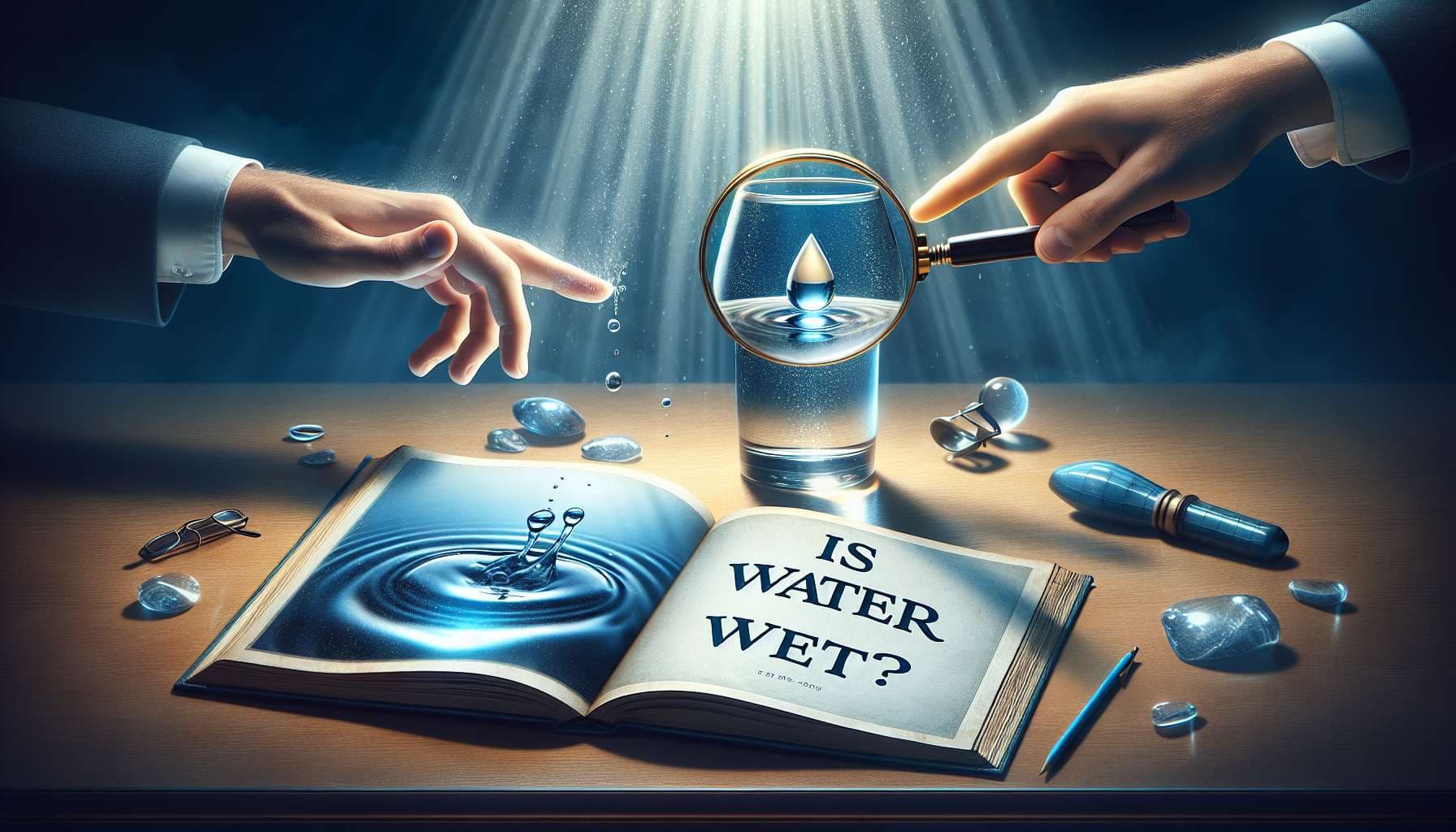
I will resolve this topic after the question closes based on the best (subjective) undisputed argument.
🏅 Top traders
| # | Trader | Total profit |
|---|---|---|
| 1 | Ṁ90 | |
| 2 | Ṁ50 | |
| 3 | Ṁ43 | |
| 4 | Ṁ28 | |
| 5 | Ṁ26 |
I was convinced of the answer that water is indeed wet.
My rationale:
As @AndrewMcKnight argues, water is not just H2O. It is a collection of H2O molecules in the liquid state and is representative of the bodies of water we commonly observe. Water can also generally be subdivided, making @willMay and @ChristopherRandles's dissenting arguments falter.
Combining @ChristopherRandles, @mattyb, and @adele's arguments, the argument that something being covered with and sticking to (adhesion/cohesion) water makes that thing wet seems to be a good definition, especially since I can't find any counterexamples. It follows that an aqueous solution of that "something" is a sufficient condition for it being wet.
Water can be in a solution with itself because the molecules can form a homogeneous mixture.
I am therefore resolving the market to Yes.
I dont think the other side's getting much so im gonna do my best. (even though honestly i do think water is wet)
By calling something wet, we mean that there is an object that is covered in or has abosorbed water. When I dip my finger in water and you ask me what its like and I say "its wet", I'm communicating to you that that is the affect it has on things it encounters. With no object, nothing is wet. Can light be bright without an object to reflect it? Water (in relation to itself)(which is what the question is posing) is not wet because water cannot wet itself.
The entire case for No seems to basically hinge around a technical definition that says only solid things are technically wet. The fact that this answer to the question is paraded as a "gotcha" surprising fun fact implies that this is not the way people intuitively understand the word. Additionally, 'wet' is also used in chemistry to describe solutions containing water, which water unambiguously is. So it's not even unambiguously correct to say that water technically isn't wet.
Wet - covered or saturated with water or another liquid.
If water is covered in water then this is just a bigger body of water and the bigger body of water is likely what we are referring to and this may well not be covered in water. Unusually you could have a blob of water covered with oil or some other liquid in which case the water would be wet but without this unusual situation the answer might appear to be no.
However I think most people would disagree with this argument.
Or maybe we can argue that most water has some oil pollution?
Wet: consisting of, containing, covered with, or soaked with liquid (such as water).
Are we’re debating if water contains water?
I took a shower this morning, in which I doused myself in water for a good 12 minutes. I got it all over me, every crevice. When I got out of the shower, I got most of the water off me, but I was still wet.
When I sat down on my bed, I got my bed wet. I had sat down on the bed earlier that day, the bed hadn’t gotten wet. It was the water, still clung onto my body until it was smushed onto the bed, which made it wet.
water molecules are covered in water molecules when they are in a solution of water (c.f. water hexamer)
it's also conceivable that water did not have this property, e.g. if water molecules repelled each other (which is sometimes not the case, pure steam and ice are not wet)
so it's meaningful and true to say that water is wet
@mattyb I like this definition of wet.
The question doesn't specify if by water we mean the substance, or H2O in liquid state, because the name "water" applys to both. Therefore the question itself is designed to be ambiguous.
The most water in the universe isn't in liquid state, but it is on Earth.
If the question is ambiguous, can you say the answer is true? For me, to answer this question, the author would need to specify if he mean the liquid state of water, or something else.
@PatrykDunski Part of this question is about arguing for the most reasonable definitions that most people can agree to. I should also clarify that the question of "is water wet" should be interpreted as a question without any specific author, as this question is typically intentionally asked in a way to foment disagreements by being concise and devoid of context or definitions.
@kaiemon understood. Actually this was rhetorical. I think you should vote "false" if the question is ambiguous. Also, the most water in the universe isn't wet. I'm sorry if that wasn't clear enough.